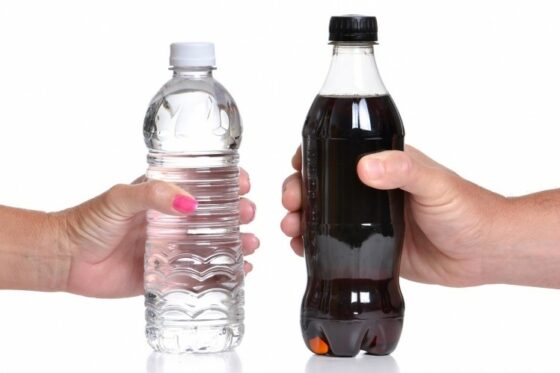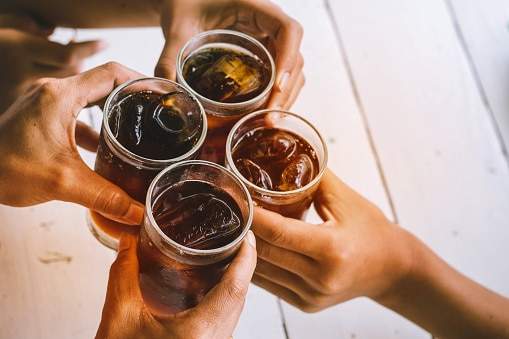Are you one of those who always keep a beverage can look at their desk?
If your response is yes, consider visiting the water cooler instead. In addition to making you gain weight, soda can also damage your health.

Typically containing nine teaspoons of sugar, soda can lead to weight gain over time.
None of the water you lose is replaced by soda. It exacerbates dehydration since it causes your body to produce more urine.
A 12-ounce drink has 45 milligrams of caffeine, twice as much as a typical cup of coffee. If you drink soda, increase your daily water intake by one glass for every soda you consume.
How much water is recommended for an average person?
Around 60% of your body weight is made up of water, most of your body. Water powers almost all cellular processes in the body; when you don’t get enough of it, these systems suffer.
We lose water daily due to processes including sweat, urine, respiration (breathing), and others. Therefore, we must consume the proper nutrients, electrolytes, and water to compensate for the loss. Electrolytes help the body retain the appropriate levels of hydration.
It differs from person to person and depends on a variety of circumstances; the following daily hydration intakes are advised:
- 15.5 cups or 3.7 liters for males
- 11.5 cups or 2.7 liters for females
Health benefits of drinking enough water

Helps maximize physical performance
If you stay hydrated, your physical performance may improve. This is essential during periods of intense exertion or high temperatures.
If you lose even 2% of the water in your body, dehydration will become apparent. It is usual for athletes to lose up to 6-10% of their water weight from sweat, though.
Changes in how the body regulates temperature lead to a drop in motivation and maybe increased fatigue. As a result, exercising may seem much more physically and emotionally complex.
If you sweat a lot when exercising, staying hydrated might help you work out as hard as possible.
Significantly affects energy levels and brain function
Your level of hydration has a significant impact on your brain.
Numerous elements of brain function can be affected by even slight dehydration, such as a loss of 1–3% of body weight, according to studies.
Researchers observed that fluid loss of 1.4% after exercise affected mood and focus in a study of young women. In addition, headaches occurred more frequently.
The same research team’s members also examined young men in a related study. The researchers discovered that working memory was observed to suffer, and there was an increase in weariness and anxiety with a fluid loss of 1.6%.
For a person weighing 150 pounds, a fluid loss of 1%–3% corresponds to a body weight loss of 1.5–4.5 pounds (0.5-2 kg) (68 kg). Even more so than during exercise or extreme temperatures, this can happen quickly during routine daily activity.
It may help prevent and treat headaches
Dehydration can cause headaches and migraines in certain people. Headaches and their consequences may be lessened by drinking more water. However, this potential benefit must be confirmed by a more reliable investigation.
It may help relieve constipation
A frequent ailment characterized by irregular bowel movements and blockages in the transit of feces is constipation.
Increasing fluid intake is a standard therapeutic method, and some evidence supports this.
Both younger and older people appear at risk for constipation from low water intake.
Helps prevent hangovers
Alcohol consumption frequently results in unpleasant aftereffects or hangovers.
Alcohol has a diuretic effect, which results in more water loss than water intake. Dehydration could arise from this.
Dehydration can result in symptoms including thirst, tiredness, headaches, and dry mouth, despite not being the leading cause of hangovers.
Drinking water before bed and at least one large glass before each drink help recover the hangover.
Can aid in weight loss
Water consumption in large quantities can aid in weight loss. This is because water can promote satiety and speed up your metabolism.
Increasing your water intake may aid in weight loss by slightly raising your metabolism, which raises the number of calories you burn daily.
The best thing to do is to have a glass of water 30 minutes before eating. You might eat fewer calories since it might make you feel more satisfied.
Is soda bad for your health?

Because soda has a lot of sugar, it is terrible for one’s health. Too much soda consumption has been linked to diabetes, heart disease, and weight gain.
Numerous health issues are correlated with excessive soda consumption. Here are some causes of soda’s harmful effects on health, regardless of the kind:
Increases cancer risk
Some sodas, including cola, have caramel coloring. Ammonium compounds are used to make caramel coloring. 4- and 2-methylimidazoles are created from sugars, ammonium compounds, and sulfites throughout the production process. Both compounds have been tested to promote animal cancer development, including liver and lung cancer.
Poor nutrition
Your nutrient intake may be negatively impacted if you consume carbonated soft drinks. Your intake of proteins, starches, dietary fiber, and vitamin B-2, often known as riboflavin, may decrease if you consume these beverages.
Soda drinkers drink less fruit and fruit juice than people who do not consume carbonated beverages.
Weight gain
It is one of the worst beverages you may drink due to its high sugar content. An examination of research articles from 30 peer-reviewed publications over forty years revealed that soda consumption is a significant factor in the rise in obesity in the United States.
Damages the teeth
Because soda contains a lot of sugar and has a high acid content, it harms teeth. Cavities are more likely as a result of the sugar. The different acids bring on tooth erosion in soda. Dentine and enamel are among the dental tissues that are lost as a result of tooth erosion.
Side effects of caffeine
Numerous soda variants contain caffeine. Caffeine use can result in issues like anxiety, jitteriness, and difficulty sleeping. Additionally addicting, caffeine makes it challenging to break the habit.
Dangers of artificial sweeteners
The majority of diet soda varieties include artificial sweeteners. Sweeteners, including saccharin, aspartame, and sucralose (Splenda), are linked to several health issues, including lupus, glucose intolerance, and multiple sclerosis. Equal and NutraSweet both include aspartame, which has been linked to an increased risk of brain tumors, mood disorders, memory loss, headaches, and seizures.
Accelerates bone loss
It is believed that the phosphate acid in soda interferes with calcium absorption, which might decrease bone mineral density.
Risk of fatty liver diseases
Sugared high-fructose corn syrup, frequently found in soda, has many harmful health effects, including non-alcoholic fatty liver disease. Cirrhosis of the liver and heart disease are significantly impacted by fatty liver disease.
Increased risk of diabetes
You run a higher chance of getting type 2 diabetes if you drink soda. The Nurses’ Health Study investigated the relationship between soda consumption and type 2 diabetes. Over 90,000 women were included in the study and monitored for eight years.
Diabetes occurred twice as frequently in research participants who reported consuming one or more servings of sugar-sweetened soda as compared to those who rarely drank soda.

Jay
Jay is a health and wellness enthusiast with expertise in water quality and nutrition. As a knowledgeable advocate for holistic well-being, Jay successfully manages Type 2 Diabetes through informed lifestyle choices. Committed to sharing reliable and authoritative insights, Jay combines firsthand experience with a passion for enhancing health."
